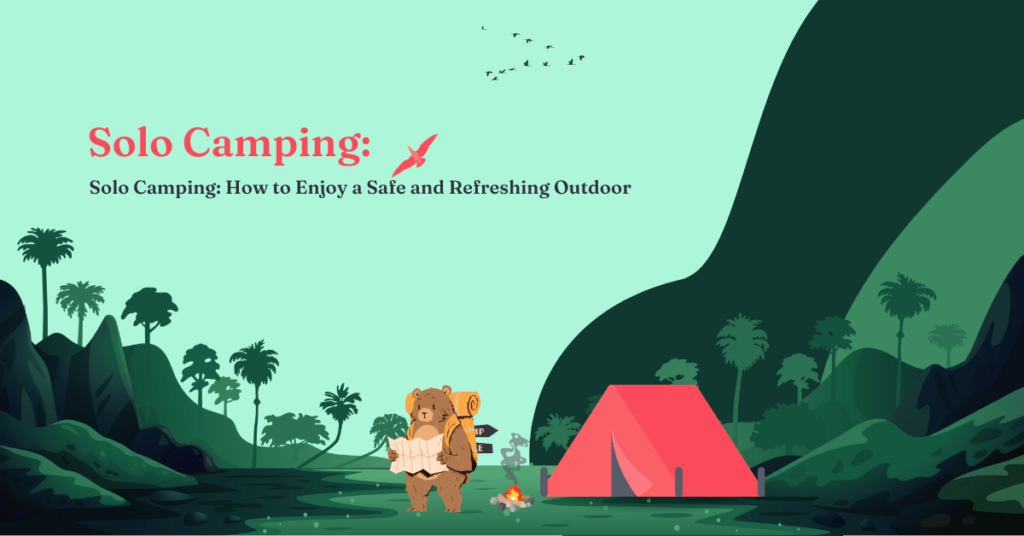Solo camping is an invigorating experience that offers a unique blend of adventure, solitude, and personal growth. Whether you’re seeking to escape the hustle of daily life, connect more deeply with nature, or challenge yourself, camping alone can be a deeply rewarding endeavor. However, embarking on a solo camping trip requires meticulous planning, safety awareness, and the right mindset. In this comprehensive guide, we’ll cover everything you need to know about solo camping, from safety tips to gear recommendations and how to make the most of your time in the wilderness.
1. Why Solo Camping? The Benefits of Going Alone
Solo camping provides a different kind of freedom compared to group camping. The absence of social interactions allows you to fully immerse yourself in nature, tune into your own thoughts, and move at your own pace. Here are a few key benefits:
- Personal Growth: Solo camping pushes you out of your comfort zone. Navigating challenges independently, such as setting up camp or preparing meals, fosters self-reliance and confidence.
- Connection with Nature: Without distractions, you can fully appreciate the sounds, smells, and sights of the outdoors. You may notice more wildlife and feel a deeper connection to your environment.
- Mental Clarity: Solo camping can act as a reset button, offering a break from technology and routine. It’s a great way to reflect, meditate, or simply enjoy the peacefulness of nature.
- Flexibility: With no one else’s preferences to consider, you can camp exactly how you like, whether that’s rising with the sun or spending hours quietly reading by the fire.
2. Preparation is Key: How to Plan for a Solo Camping Trip
When camping alone, preparation is crucial. Since you won’t have the support of others, it’s vital to be self-sufficient and thoroughly prepared for any situation. Here’s how to get started:
Choose a Safe and Suitable Location
For your first solo camping trip, it’s advisable to pick a well-established campsite. National parks and designated camping grounds often provide a balance of safety and solitude. Look for places that are known for being safe and have easy access to emergency services if needed.
- Proximity: Choose a location that isn’t too far from civilization, especially for beginners. You don’t need to venture deep into the backcountry for a rewarding experience.
- Terrain: Consider your skill level and choose terrain that matches your experience. Forests, lakesides, or even beach camping can be more approachable for first-time solo campers.
Research the Area
Before setting out, research the area you plan to camp in. Understand the terrain, local wildlife, weather patterns, and any potential hazards. Download offline maps and make note of the nearest ranger station or emergency service locations.
- Check the Weather: Always check the weather forecast leading up to your trip and prepare for sudden changes. Bring appropriate clothing and gear for rain, wind, or cold temperatures.
- Wildlife Awareness: Learn about the local wildlife and how to store food safely to avoid attracting animals. Bear-proof containers, for example, might be essential in certain areas.
Pack the Essentials
When solo camping, you’ll need to pack light yet carry everything necessary to survive. Here’s a list of must-have items for a solo camping trip:
- Tent: Choose a lightweight, easy-to-set-up tent. A one-person tent is ideal for solo trips.
- Sleeping Bag and Pad: A warm sleeping bag suited to the season and a comfortable sleeping pad are essential for a good night’s sleep.
- Cooking Gear: A portable stove, lightweight pots and pans, and enough fuel for the duration of your trip are essential. Don’t forget a reliable lighter or waterproof matches.
- First Aid Kit: A comprehensive first aid kit, including bandages, antiseptic, and any personal medications, is vital.
- Navigation Tools: Bring a map, compass, or GPS device. A phone with offline maps can work, but ensure it’s fully charged, and carry a power bank.
- Headlamp and Extra Batteries: A hands-free light source is invaluable, especially when setting up camp or cooking after dark.
- Water Filtration: If your camping site doesn’t provide potable water, bring a water filter or purification tablets.
- Bear Spray or Whistle: For areas with wildlife, bear spray is a good precaution. A loud whistle can also alert others if you’re in distress.
3. Safety First: How to Stay Safe When Camping Alone
When you’re solo camping, your safety should always be the top priority. Here are some vital safety tips to keep in mind:
Tell Someone Your Plan
Before you leave, inform a trusted friend or family member about your trip details. Share your exact camping location, planned route, and estimated return time. Check in with them once you return to ensure they know you’re safe.
Stay Aware of Your Surroundings
Solo campers need to be especially vigilant about their surroundings. Pay attention to nearby water sources, any signs of wildlife, or other campers. Familiarize yourself with the landscape so you can easily find your way back to your campsite if needed.
- Avoid Camping Near Hazardous Areas: Don’t set up camp near dead trees (risk of falling limbs), cliff edges, or flood-prone areas.
- Stay Visible: Use bright colors for your tent and gear so you can be spotted from a distance, whether by other hikers or rescuers in an emergency.
Emergency Communication
Bring a reliable communication device, such as a satellite phone or personal locator beacon (PLB), especially in areas with no cell service. These devices can send an emergency signal with your exact location to rescuers.
Respect Wildlife
Avoid any interaction with wildlife. Keep your food stored securely, preferably using a bear bag or canister. Maintain a clean campsite by disposing of food scraps and trash properly.
4. How to Enjoy and Make the Most of Your Solo Camping Experience
While safety and preparation are critical, it’s equally important to focus on enjoying your time alone. Here are some tips to fully immerse yourself in the solo camping experience:
Engage in Mindfulness
Solo camping is the perfect opportunity to practice mindfulness. Whether it’s through meditation, journaling, or simply observing your surroundings, use this time to clear your mind and reduce stress.
- Watch Sunsets and Sunrises: Witnessing these natural wonders without distractions can be a profoundly calming experience.
- Listen to Nature: Pay attention to the sounds of birds, rustling leaves, or flowing streams. Allow nature to lull you into a state of relaxation.
Explore Your Surroundings
Take time to hike nearby trails, explore lakes, or climb hills. Solo camping offers the flexibility to set your own agenda, so follow your curiosity and explore at your own pace.
Document Your Experience
Bring along a camera, sketchpad, or journal to document your journey. Capturing moments through photos or writing can help you remember the experience and reflect on your solo adventure.
Practice Bushcraft Skills
Take the time to learn or practice outdoor skills such as fire-starting, shelter-building, or identifying edible plants. Solo camping offers the perfect setting for improving your bushcraft abilities without distractions.
5. Common Challenges of Solo Camping and How to Overcome Them
Dealing with Loneliness
It’s normal to feel lonely or uneasy at first. To counteract this, bring along some comforting items from home—a favorite book, a cozy blanket, or some music. Over time, many solo campers find the silence and solitude to be one of the most rewarding aspects of their trip.
Fear of the Dark
Many first-time solo campers find the quiet darkness unsettling. To ease these fears, set up a comfortable, well-lit camp. Keep a fire going or use a headlamp to create a sense of safety. Eventually, you may come to appreciate the serenity of a night in the wilderness.
Staying Motivated
Without others to keep you accountable, it can be easy to fall into a lull. Create a simple plan for your days, setting goals like hiking a specific trail or reaching a certain viewpoint to keep yourself active and engaged.
Conclusion
Solo camping is an empowering and deeply rewarding way to experience the great outdoors. By preparing properly, staying mindful of safety, and embracing the freedom that comes with solitude, you can enjoy a fulfilling and refreshing solo retreat. Whether you’re a seasoned camper or a first-timer, solo camping allows you to reconnect with both nature and yourself in an unparalleled way. So, pack your gear, take a deep breath, and head into the wilderness—your solo adventure awaits!



